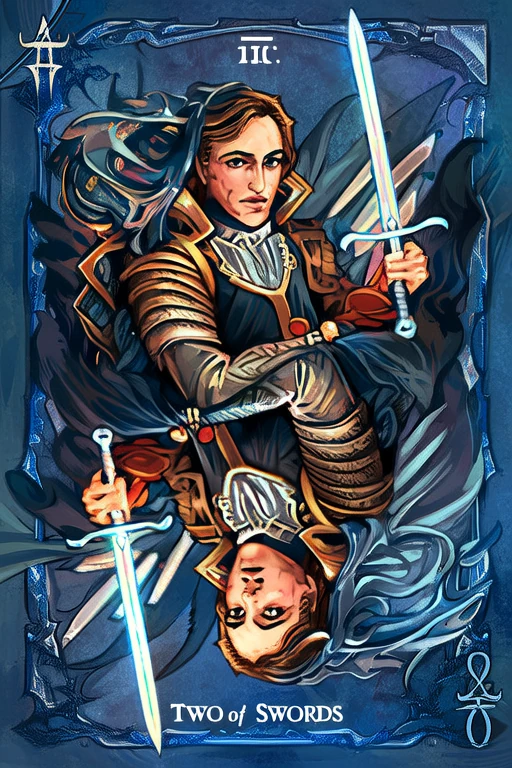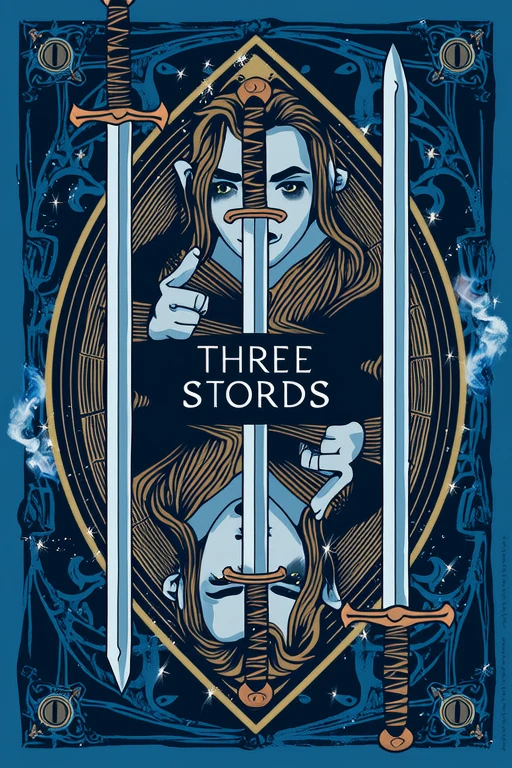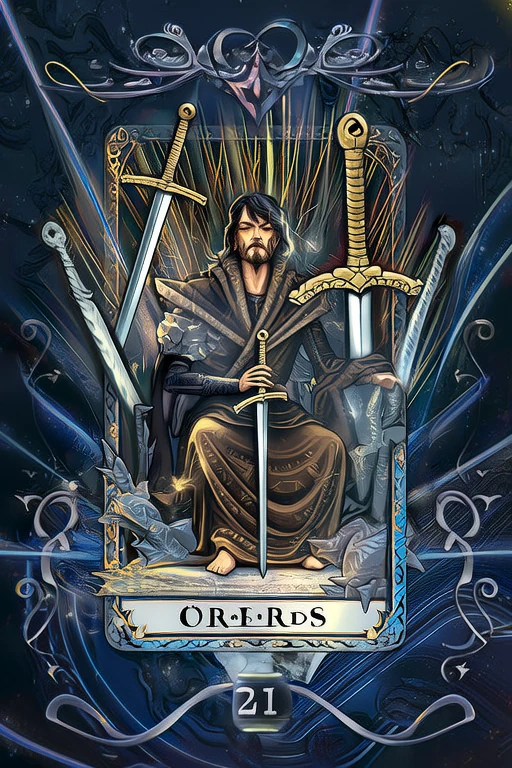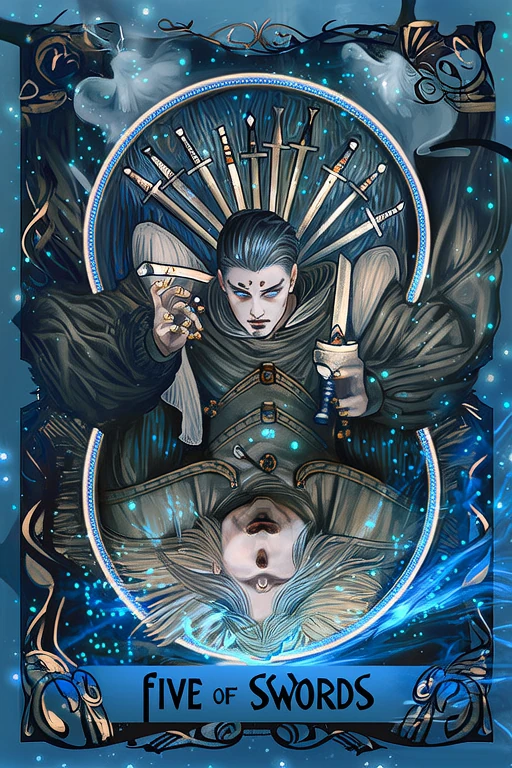
Ace of Swords
Discover the deep meaning of Ace of Swords with our free AI-powered tarot interpretation. Get instant, accurate readings based on advanced tarot knowledge.
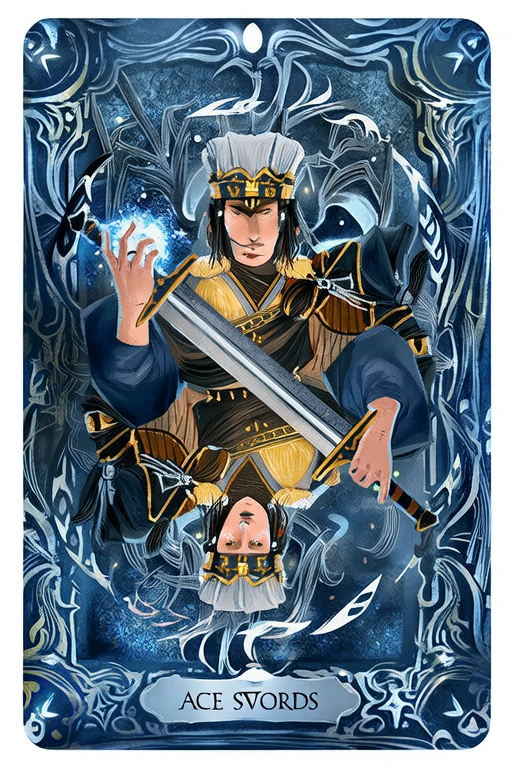
Keywords
Upright Meaning
Breakthrough, clarity, sharp mind
Reversed Meaning
Confusion, brutality, chaos
Full Interpretation
The Ace of Swords represents mental clarity, breakthrough insights, and sharp thinking.
In-Depth Analysis
📜 Historical Background
The Ace of Swords, known in Chinese as 宝剑王牌, is the first card of the Suit of Swords in the Minor Arcana of the Tarot deck. Its origins trace back to the early 15th century when tarot cards were first used in Europe, particularly in Italy and France, as playing cards before they were adopted for esoteric and divinatory purposes. The Suit of Swords is traditionally associated with the element of Air, representing intellect, communication, and mental clarity, and the Ace of Swords serves as the purest embodiment of these energies.
In the earliest tarot decks, such as the 15th-century Visconti-Sforza and the Marseille Tarot, the Ace of Swords was often depicted as a single sword rising upward, often held by a hand emerging from a cloud or surrounded by a crown or laurel wreath. These early images symbolized divine authority, victory, and clarity of thought. The sword itself was a symbol of power, justice, and the ability to cut through illusion—themes that have remained consistent throughout the evolution of the card.
As tarot evolved during the 18th and 19th centuries, especially with the rise of occultism and the Hermetic tradition, the Ace of Swords took on deeper mystical meanings. The Hermetic Order of the Golden Dawn and later the Rider-Waite-Smith Tarot (1909), illustrated by Pamela Colman Smith and co-created by A.E. Waite, played a significant role in shaping the modern interpretation of the card. In the Rider-Waite-Smith version, the Ace of Swords features a central sword surrounded by olive branches and a crown, symbolizing peace and wisdom gained through mental clarity and truth.
Throughout history, the Ace of Swords has been associated with various mythological and symbolic figures. In some interpretations, it reflects the sword of Archangel Michael, symbolizing divine protection and truth. In Norse mythology, it can be linked to the sword Gram from the saga of Sigurd, which was thrust into a tree and later wielded to defeat evil. These mythic associations reinforce the card’s themes of strength, justice, and the power of the mind.
Different tarot decks interpret the Ace of Swords with varying imagery and symbolism. For example, the Thoth Tarot by Aleister Crowley and Lady Frieda Harris renames it “The Lord of Air and the Breath of God,” emphasizing its connection to the intellect and the element of Air. Meanwhile, modern decks often incorporate contemporary themes, such as mental health awareness or personal empowerment, while retaining the core essence of clarity and truth.
Across cultures, the Ace of Swords has been interpreted through various lenses, including Eastern philosophies where the sword symbolizes the cutting through of ignorance and illusion—similar to the concept of enlightenment in Buddhism. In Western esoteric traditions, it often represents the power of the word, the importance of truth, and the necessity of clear thinking in overcoming life’s challenges. These diverse interpretations highlight the card’s universal appeal and enduring significance in the tarot tradition.
Symbolism & Imagery
The Ace of Swords is rich in symbolic meaning, with each visual element contributing to its overall significance. At its core, the card represents clarity, truth, and the power of the mind. The central sword is the most prominent symbol, signifying intellect, decision-making, and the ability to cut through confusion or falsehoods. The upward-pointing blade indicates a rise in awareness, a breakthrough in understanding, or a moment of enlightenment.
Surrounding the sword, the crown and olive branches—especially in the Rider-Waite-Smith version—add layers of meaning. The crown symbolizes authority, victory, and mastery over one’s thoughts and circumstances. The olive branches, traditionally a sign of peace, suggest that clarity and truth can lead to harmony and resolution. Together, they imply that the use of one’s intellect can lead not only to personal success but also to peace and balance in relationships or situations.
Colors also play a crucial role in the symbolism of the Ace of Swords. In most decks, the background is often a pale blue or white, representing purity, clarity, and the realm of the mind. The gold of the crown and the silver of the sword reflect divine wisdom and mental acuity, respectively. These color choices reinforce the card’s association with higher thought and spiritual insight.
Numerologically, the number one—represented by the Ace—symbolizes beginnings, independence, and leadership. As the first card of the Suit of Swords, it marks the start of a journey into the realm of the intellect and the challenges that come with it. It encourages the querent to take initiative, assert their thoughts, and pursue truth with courage.
Interpretations of the Ace of Swords vary across cultures and tarot traditions. In Western esotericism, it is often seen as a card of divine inspiration and mental clarity. In Eastern interpretations, particularly those influenced by Buddhist or Taoist thought, the sword can symbolize the cutting through of illusion and the attainment of wisdom. In some modern decks, the card may also reflect the importance of standing up for one’s beliefs or using one’s voice to speak truth to power.
When upright, the Ace of Swords typically signifies clarity, truth, and a breakthrough in understanding. It suggests that the querent is gaining insight into a situation and is ready to make a decisive move. It can also indicate legal victories, intellectual achievements, or the resolution of long-standing issues through clear thinking.
Reversed, the Ace of Swords may point to confusion, denial, or the misuse of power. It can indicate that the querent is avoiding the truth, experiencing mental blocks, or struggling with indecision. There may be a need to reevaluate one’s thoughts or to be cautious about how one uses their words or intellect.
The Ace of Swords has strong connections with other cards in the tarot deck. It is often linked with the Major Arcana card The Lovers, which also deals with clarity and decision-making. In contrast, it can be seen as the opposite of the Five of Swords, which represents the misuse of intellect or betrayal. When appearing alongside other Aces, it reinforces the idea of a new beginning grounded in truth and clarity.
Overall, the Ace of Swords stands as a powerful symbol of mental clarity, truth, and the strength of the human mind. Whether upright or reversed, it challenges the querent to seek the truth, speak it clearly, and use their intellect wisely in navigating life’s challenges.
Psychological Insights
From a psychological perspective, the Ace of Swords resonates deeply with Carl Jung’s theory of archetypes, particularly the archetype of the Sage or the Wise One. This archetype embodies the pursuit of knowledge, truth, and understanding. The Ace of Swords represents the moment when the unconscious mind reveals a truth that the conscious mind was previously unaware of—often leading to a sudden realization or breakthrough. This aligns with Jung’s concept of individuation, the process by which a person integrates the conscious and unconscious aspects of the psyche to achieve wholeness.
In modern life, the Ace of Swords offers valuable insights for decision-making and problem-solving. Its appearance in a reading often signals a time of clarity, when previously confusing situations begin to make sense. This card encourages individuals to trust their intellect and intuition, to seek out facts, and to make decisions based on truth rather than emotion or fear. It is particularly relevant in today’s fast-paced, information-saturated world, where discernment and critical thinking are essential skills.
For personal growth and self-awareness, the Ace of Swords serves as a reminder to confront the truth, even when it is uncomfortable. It challenges individuals to examine their own beliefs, biases, and assumptions, and to be willing to change their minds when presented with new information. This process of self-reflection and intellectual honesty is crucial for personal development and emotional maturity.
In therapeutic and counseling settings, the Ace of Swords can be a powerful tool for guiding clients toward clarity and resolution. Counselors may use the card to help clients identify mental blocks, challenge distorted thinking patterns, or gain insight into complex emotional issues. The card’s emphasis on truth and mental clarity can be particularly useful in cognitive-behavioral therapy (CBT), where identifying and correcting irrational thoughts is a key focus.
Modern spiritual practices also incorporate the Ace of Swords as a symbol of divine guidance and mental clarity. Many practitioners use the card in meditation or visualization exercises to enhance focus, sharpen intuition, and align with higher wisdom. In energy healing and chakra work, the Ace of Swords is often associated with the third eye chakra, which governs intuition and insight. Visualizing the sword of truth cutting through mental fog can be a powerful technique for clearing blockages and gaining clarity.
Additionally, the Ace of Swords plays a role in affirmations and journaling practices. Individuals may use affirmations such as “I seek the truth with courage” or “My mind is clear and focused” to align with the card’s energy. Journaling prompts might include questions like, “What truth am I avoiding?” or “How can I use my intellect to resolve this situation?” These practices help integrate the card’s message into daily life, promoting mental clarity and personal empowerment.
Overall, the Ace of Swords holds profound psychological and spiritual significance in modern times. It encourages individuals to embrace truth, sharpen their minds, and use their intellectual power to navigate life’s complexities with clarity and confidence.
Correspondences
The Ace of Swords is deeply connected to the element of Air and the astrological sign of Gemini, ruled by Mercury. Mercury governs communication, intellect, and logical reasoning, aligning perfectly with the card’s themes of clarity, truth, and mental acuity. This planetary influence enhances the card’s association with quick thinking, effective communication, and the power of words. The mutable nature of Gemini further emphasizes adaptability and the ability to see multiple perspectives, reinforcing the Ace of Swords’ role in revealing new insights and shifting mental paradigms.
In terms of gemstones and crystals, the Ace of Swords resonates with clear quartz, amethyst, and lapis lazuli. Clear quartz amplifies clarity and enhances mental focus, making it ideal for those seeking truth and understanding. Amethyst supports mental clarity and helps quiet the mind for deeper insight, while lapis lazuli is known as the stone of wisdom and truth, aiding in self-awareness and intellectual growth. These stones can be used during meditation or placed near workspaces to enhance concentration and promote clear thinking.
Herbs and essential oils associated with the Ace of Swords include lavender, sage, and peppermint. Lavender promotes mental clarity and reduces stress, making it useful for those seeking inner truth. Sage is traditionally used for purification and clearing mental fog, while peppermint stimulates the mind and enhances focus. These can be used in aromatherapy, herbal sachets, or ritual work to align with the card’s energy.
The Ace of Swords corresponds to the season of spring, particularly the early part of the season when new ideas and plans begin to take root. It is also linked to the hours around midday, when the mind is most alert and active. As an Air card, it aligns with the direction of the East, the realm of new beginnings and intellectual pursuits.
In chakra work, the Ace of Swords is primarily connected to the third eye chakra (Ajna), which governs intuition, insight, and higher knowledge. Balancing this chakra can enhance clarity, sharpen perception, and support spiritual awakening. It also has secondary connections to the throat chakra, which governs communication and self-expression.
Numerologically, the Ace of Swords carries the vibration of the number one, representing new beginnings, leadership, and individuality. It encourages the querent to take initiative, trust their intellect, and pursue truth with confidence. This numerological influence reinforces the card’s message of clarity, empowerment, and the power of the mind to shape reality.
❓ Frequently Asked Questions
The Ace of Swords is a powerful and often misunderstood card in tarot readings. Below are some frequently asked questions and practical insights to help both beginners and seasoned readers interpret it effectively.
**1. What does the Ace of Swords mean in a love reading?** In a love context, the Ace of Swords can indicate a new beginning marked by clarity and honest communication. If you're single, it may suggest a potential new relationship where truth and intellectual connection are key. For those in a relationship, it can signal a breakthrough in communication or a resolution to a misunderstanding. However, if the card appears reversed, it may warn of miscommunication, dishonesty, or unresolved conflicts that need to be addressed.
**2. Is the Ace of Swords always a positive card?** While the Ace of Swords is generally seen as a positive card representing clarity and truth, its energy can be sharp and intense. In some contexts, it may indicate painful truths or difficult decisions. The key is to recognize that truth, even when uncomfortable, leads to growth. The reversed position often highlights confusion, denial, or the misuse of intellectual power, so context and surrounding cards are important for accurate interpretation.
**3. What are common beginner misconceptions about the Ace of Swords?** Many beginners fear the Ace of Swords because of its association with conflict or harsh truths. However, it is not inherently negative—it simply brings clarity. Another misconception is that it always refers to verbal communication, but it can also relate to thoughts, decisions, or legal matters. Understanding that the card emphasizes mental clarity and truth helps avoid misinterpretation.
**4. What are effective spreads for reading the Ace of Swords?** A simple three-card spread can be effective: past, present, future. If the Ace of Swords appears in the present position, it suggests a current breakthrough or realization. In a five-card spread, such as the Celtic Cross, its placement can indicate the core issue or challenge. For decision-making readings, placing the Ace of Swords in the 'insight' or 'advice' position can highlight the need for clarity and logic.
**5. How does the Ace of Swords interact with other cards?** The Ace of Swords works well with other Air cards (e.g., the Aces of Wands or the Two of Swords) to emphasize intellectual clarity. When paired with the High Priestess or Moon, it suggests that intuition and logic must be balanced. With the Five of Swords, it can warn of dishonesty or manipulation. When combined with the Empress or Six of Cups, it may indicate a need to balance logic with emotional intelligence.
**6. How can I interpret the Ace of Swords in a career or business reading?** In a career context, the Ace of Swords often signals a new opportunity, a promotion, or a breakthrough in a project. It advises using clear thinking and logical planning to move forward. If reversed, it may indicate confusion, misinformation, or ethical dilemmas that need to be addressed before proceeding.
**7. What practical advice can I give when the Ace of Swords appears in a reading?** Encourage the querent to seek clarity, ask direct questions, and trust their intellect. If the card appears reversed, advise them to reevaluate their thoughts, avoid making hasty decisions, and be honest with themselves. Journaling, meditation, or consulting a mentor may be beneficial to gain deeper insight.
By understanding the nuances of the Ace of Swords and its interactions with other cards, readers can offer more insightful and actionable guidance to those seeking clarity and truth in their lives.
Practical Readings
Love Reading – Free • Online • AI • Instant • Accurate
In love, Ace of Swords upright: Breakthrough, clarity, sharp mind. Reversed: Confusion, brutality, chaos.
Career Reading – Free • Online • AI • Instant • Accurate
For career, Ace of Swords upright: Breakthrough, clarity, sharp mind. Reversed: Confusion, brutality, chaos.
Yes‑No Reading – Free • Online • AI • Instant • Accurate
As a quick yes‑no: upright tends toward “yes”, reversed leans “no”—interpret within your question’s context.
FAQ
What does Ace of Swords mean in tarot?
Ace of Swords represents breakthrough, clarity, sharp mind. This card encourages The Ace of Swords represents mental clarity, breakthrough insights, and sharp thinking.
What is Ace of Swords reversed meaning?
When Ace of Swords appears reversed, it signifies confusion, brutality, chaos. Consider areas that may require adjustment or release.
Is Ace of Swords a positive card?
Ace of Swords is generally considered a neutral to positive card, representing breakthrough, clarity, sharp mind.
What should I do if I draw Ace of Swords?
If you draw Ace of Swords, focus on breakthrough, clarity, sharp mind. Align actions with the card’s upright energy.
How do I interpret Ace of Swords in a love reading?
In love readings, Ace of Swords suggests breakthrough, clarity, sharp mind in relationships. Consider how breakthrough and clarity apply to your situation.
What does Ace of Swords mean in a love reading?
In love, Ace of Swords points to breakthrough, clarity, sharp mind when upright and confusion, brutality, chaos reversed. Reflect on relational balance & authenticity.
How is Ace of Swords interpreted in career?
For career, Ace of Swords upright highlights breakthrough, clarity, sharp mind while reversed warns of confusion, brutality, chaos—adjust planning & execution.
What is the financial meaning of Ace of Swords?
Financially, Ace of Swords suggests breakthrough, clarity, sharp mind potential; reversed indicates confusion, brutality, chaos—use prudent pacing.
Is Ace of Swords a yes or no card?
Ace of Swords is generally a context-dependent when upright; reversed leans toward hesitation or NO—apply to the nuance of your question.
References
References
- Encyclopaedia Britannica – Tarot
Historical overview and cultural context of tarot cards.
- Wikipedia – Tarot
General reference on tarot history, structure, and usage.
- Biddy Tarot – Tarot Card Meanings
Widely cited interpretations and learning resources.
- Labyrinthos – Tarot Card Meanings
Educational articles on major and minor arcana.
